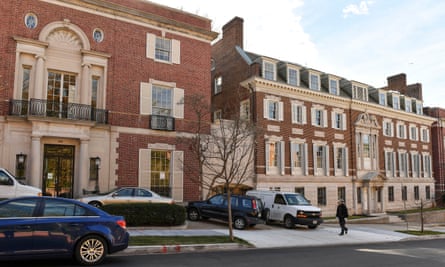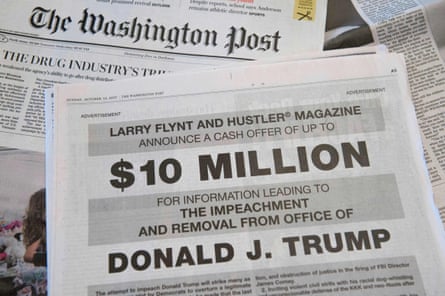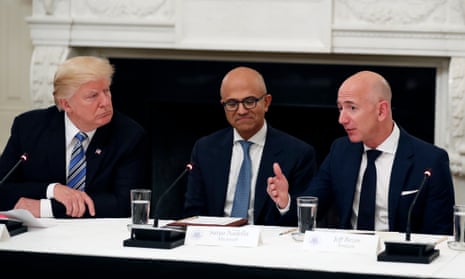Nestled between the embassy of Myanmar and the historic home of Woodrow Wilson, the biggest house in Washington DC is taking shape. A yellow digger is parked outside, construction workers throw sandbags over their backs, and thick black tubes stretch from high windows to the ground like the legs of a giant octopus. Inside, a foreman in a baseball cap sits behind a desk at a laptop. “Going good,” he says.
This will be the luxury home of Jeff Bezos, founder of Amazon, owner of the Washington Post and would-be first man on Mars. A sign on the corner of S Street in the swish Kalorama neighbourhood still points to the textile museum that occupied the 27,000 sq ft property before Bezos bought it for $23m. Along the row there are flags and signs supporting immigrants and gay rights; there are diplomatic outposts including the Irish ambassador’s residence. On one doorstep, the inevitable: a package from Amazon.
Renovation of the Bezos mega-mansion is due for completion in September 2019, granting the multibillionare ready access to the Post’s state-of-the-art headquarters on K Street and, potentially, Amazon’s second HQ, for which Washington and surrounding areas are pushing hard. In a city where Donald Trump occupies the White House and owns a huge five-star hotel, it appears the stage is set for an epic battle: the world’s richest man versus its most powerful.
For two and a half years Trump has launched Twitter attacks against Bezos, spuriously claiming Amazon benefits from billions of dollars in subsidies from the US Postal Service while dodging the taxman. Few doubt the president’s animus is truly motivated by Bezos’s ownership of the Post – a bastion of what he calls the “fake news” media – along with, perhaps, envy of his wealth.
In March, Bezos topped the Forbes rich list for the first time with $112bn, making him the first person to break $100bn since Forbes began the ranking in 1987. Trump’s fortune dropped by about $400m to $3.1bn during his first year in office, leaving him as the world’s 766th-richest person – a fall of more than 200 places.
“Bezos is as rich as he claims, Trump never was,” said Michael D’Antonio, a political commentator and author of The Truth About Trump.
“He’s ranked many hundreds of places higher than Trump on the scale of wealth and he did it without any inheritance of the sort that Trump had. He’s respected in a way that Trump never was as a businessperson. He is circumspect in the way that Trump is not. He’s everything that Trump hates.”
The men are a study in contrasting styles. One is defiantly bald, the other has a combover; one has a famously raucous laugh, the other seems allergic to laughing at all; one has an iron discipline in messaging and insists on six-page memos, the other is a verbal scattergun of provocations and self-contradictions and allegedly refuses to read briefing documents.

Bezos founded Amazon as an online bookseller in 1994 and has expanded it to a retailer of breathtaking scale and range, including even groceries in brick-and-mortar stores after its $13.7bn purchase of Whole Foods Markets last year. It also runs data centres and makes TV shows and, some analysts say, is becoming dangerously big.
Bezos, 54, has poured part of his wealth into Blue Origin, a maker of rockets that aims to lead space tourism. Its owner, whose father is a Cuban immigrant, has also donated to progressive causes such as same-sex marriage and to mostly Democratic candidates in elections.
He bought the Post from the celebrated Graham family for $250m, five years ago. In a letter to its employees, he urged two kinds of courage: “The first is the courage to say wait, be sure, slow down, get another source. Real people and their reputations, livelihoods and families are at stake. The second is the courage to say follow the story, no matter the cost. While I hope no one ever threatens to put one of my body parts through a wringer, if they do, thanks to Mrs Graham’s example, I’ll be ready.”
This was a reference to former publisher Katharine Graham who, during the paper’s digging into Watergate scandal in the 1970s, was threatened by Richard Nixon’s attorney general, John Mitchell: “Katie Graham’s gonna get her tit caught in a big fat wringer if that’s published.” In an interview with Post editor Marty Baron in May 2016, Bezos elaborated: “I have a lot of very sensitive and vulnerable body parts but if need be they can all go through the wringer rather than do the wrong thing.”
#SendDonaldtoSpace
Bezos’s investment has reinvigorated the Post, enabling it to hire dozens of new reporters and take on the New York Times in an old fashioned newspaper war. Both have enjoyed increased readership in the Trump era. Both have attracted opprobrium as nodes of the anti-Trump resistance.
Trump has attempted to conflate Amazon and the Post at least a dozen times, claiming that the paper is a lobbying tool to help the Seattle-based behemoth evade sales taxes. Back in December 2015, he tweeted: “If @amazon ever had to pay fair taxes, its stock would crash and it would crumble like a paper bag. The @washingtonpost scam is saving it!”
Bezos, probably as sceptical of Trump’s electoral chances as anyone else, responded wryly: “Finally trashed by @realDonaldTrump. Will still reserve him a seat on the Blue Origin rocket. #sendDonaldtospace”
By October 2016, the Trump threat had become real. Bezos told a conference in San Francisco: “He’s not just going after the media, but threatening retribution to people who scrutinse him. He’s also saying he may not give a graceful concession speech if he loses the election. That erodes our democracy around the edges. He’s also saying he might lock up his opponent. These aren’t appropriate behaviours.”
Since the Republican insurgent’s shock victory, Bezos has followed the example of special counsel Robert Mueller by maintaining a sphinx-like silence and refusing to be baited. Nothing, it seems, infuriates the president more. D’Antonio said: “Trump doesn’t know what to do with someone who won’t play and it would be a grave mistake for Bezos to engage. He doesn’t have to.
“Bezos is just ontologically the opposite of Donald Trump and that gets under Trump’s skin. What he really hates is someone who appears to be incorruptible. He reads that as being superior, haughty, holier than thou. It’s what he hates about Mueller: that Mueller is an emblem of rectitude. There’s no evidence that Bezos is anything but a tough business person.”
Trump has upped the bombardment. Last year he pondered: “Is Fake News Washington Post being used as a lobbyist weapon against Congress to keep Politicians from looking into Amazon no-tax monopoly?” He has not yet bequeathed on Bezos one of his infamous nicknames but has come up with the formula: “Amazon Washington Post.”

What is driving this? Sam Nunberg, a former senior adviser to Trump’s election campaign, said this week: “Amazon, Google and Facebook are essentially monopolies in different sectors; even Rupert Murdoch is trying to fight Facebook. Suddenly it looks like the whole country is going to be Amazon Valley. The president does not like monopolies – he likes competition.”
As for Bezos, Nunberg said: “I think the president sure doesn’t like him but Bezos doesn’t like the president either.”
The notion that Amazon is ripping off the US Postal Service (USPS) has been widely debunked. The Politifact website rated Trump’s claim false, noting that the Amazon deal must be at least a break-even venture because a 2006 law makes it illegal for the USPS to price parcel delivery below its cost. “Amazon isn’t causing the United States Postal Service to lose a fortune,” the website concluded. “In fact, it’s contributing to its biggest growth sector, package delivery. Deals like the one with Amazon brought in $7bn in fiscal year 2017.”
Last month the Post reported that Trump has personally pushed postmaster general Megan Brennan to double the rate the USPS charges Amazon and other firms to ship packages. On Wednesday two Democrats, Elijah Cummings, ranking member of the House committee on oversight and government reform, and Gerald Connolly, ranking member of the subcommittee on government operations, rebuked the president and pointed out that Amazon is not receiving any preferential treatment.
“It is highly inappropriate to use the authority of your office to attack a political rival and seek to impair his business financially,” they wrote. “It is even more inappropriate to launch such attacks using false claims that are not supported by the facts. The allegations you have made about Amazon and the Postal Service are inaccurate, and we ask that you correct the record.”
Bezos and the Post also deny that he ever attempts to meddle in the paper’s editorial coverage. Baron told the New York Times in April: “I can’t say more emphatically he’s never suggested a story to anybody here, he’s never critiqued a story, he’s never suppressed a story. Frankly, in a newsroom of 800 journalists, if that had occurred, I guarantee you, you would have heard about it.”
D’Antonio, the Trump biographer, said: “As far as I know, Bezos is hands-off with the Washington Post and that is something that Trump can’t understand. The fact that this person would have a commitment to a free press and, as a publisher, honour the separation of editorial and business interests is anathema to Trump. His very being is a rebuke to Trump, so it all makes sense to me.
“If Trump owned a newspaper, it would be called The Daily Trump and he would have a front-page column. I have no doubt of that.”
Overlapping interests
Experts who have met Bezos and chronicled his career say he is unlikely to be fazed by Trump’s jabs. Brad Stone, author of The Everything Store: Jeff Bezos and the Age of Amazon, said: “He is extremely compelling, charismatic, incredibly intelligent, an incredibly disciplined communicator on behalf of the interests of his company. He doesn’t let emotions govern his responses. Everything is well articulated and thought out. It’s been honed at Amazon for decades.”
Amazon will be aware that Trump is not forever, Stone added. “They do think over the long term, five or 10 years, and they probably have business ambitions with the government. This is not going to last for more than three or seven years. They probably view it as a squall and they’ll stay huddled under their umbrellas until it passes.”
And even now, Trump v Bezos can be seen as a skirmish rather than all out war. The latter was among tech chief executives who met the president-elect at Trump Tower in New York in December 2016; with other tech chiefs, Bezos has also been to the White House. Amazon has continued to work with the White House on initiatives around cyber-bullying, artificial intelligence and first lady Melania Trump’s “Be Best” campaign. There are overlapping interests in space exploration.
Tim Fernholz, author of Rocket Billionaires: Elon Musk, Jeff Bezos, and the New Space Race, said: “What is interesting about this feud is that Trump’s policies towards towards commercial space companies like Blue Origin have been very positive. Things are very rosy between Blue Origin and Nasa. This is flying below the radar of everything that’s happening.”
Bezos has been obsessed with space since childhood, when he reenacted Star Trek scenes with friends.
“With Blue Origin, Jeff Bezos is very personally invested and he goes to rocket launches,” Fernholz added. “I think the Washington Post is philanthropy, an experiment in digital media – he says Don Graham talked him into buying it – whereas he was talking about rockets since he was a kid. I think he is proud of the Post and excited about space.”
Trump’s obsessive tweets are not likely to keep Bezos up at night, considering all the other complaints in Amazon’s in-tray, according to Fernholz.
“People are worried about the way they treat their workers, worried about the taxes they pay and worried about what market they’re going into next. Jeff Bezos is the world’s richest man and he’s thinking five or 10 years ahead, so he’s got bigger problems than Donald Trump to think about.”
